2019 UN
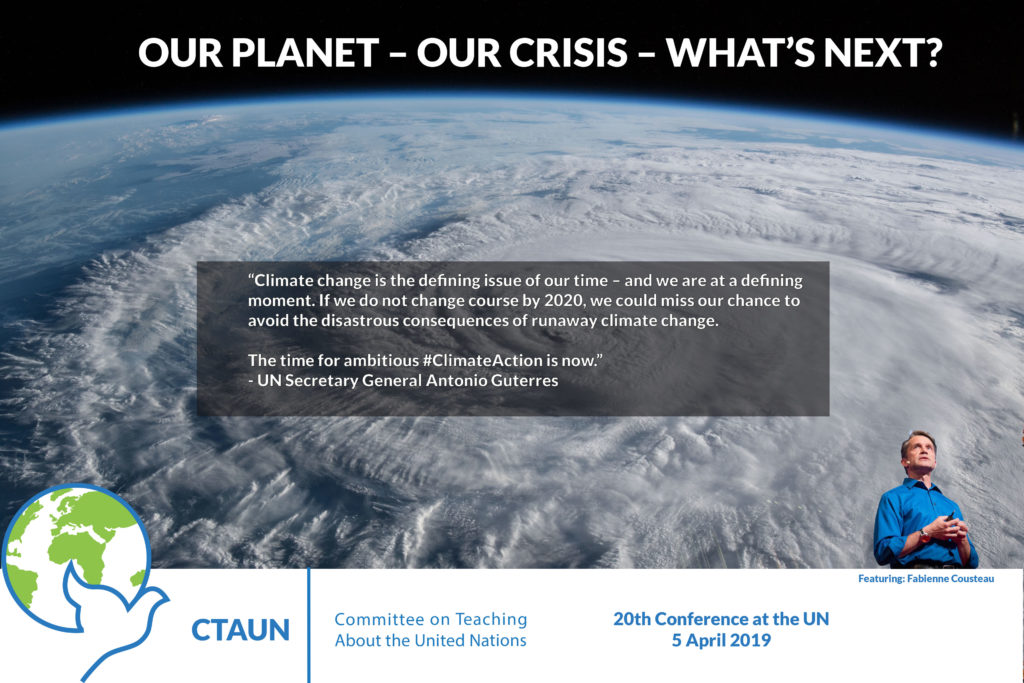
“OUR PLANET – OUR CRISIS – WHAT’S NEXT?”
On 10 September 2018, UN Secretary-General Antonio Guterres delivered a series of definitive remarks on the state of Planet Earth, which were followed on 8 October by the devastating UN report on global warming issued by the Intergovernmental Panel on Climate Change (IPCC).“Let there be no doubt about the urgency of the crisis,” the S-G said.
Educators have a responsibility to help their students and community to learn about how they can bring about effective climate action. The challenges may appear overwhelming, but the responsibility of citizens is to be informed and to engage in solutions. As educators, we need to develop young people to be our next generation of leaders in this effort. In addition to meeting the moral challenge of saving lives by reimagining a world of green energy, halting the deforestation that causes floods, limiting the huge numbers of people forced out of their homes and more, there is the wonder and excitement that comes with ingenuity. If students become knowledgeable about climate change and proactive in protecting our planet already in crisis, the hope to save it will continue.
CTAUN’s annual conference – Our Planet – Our Crisis – What’s Next? – held on April 5, 2019, was attended by more than 550 educators and young people who filled the conference room to capacity. Presenters shared the information and materials addressing ways in which teachers can effect changes in their classrooms to address climate change, as well as how all of us can help in meeting this great challenge of our time.
The conference highlighted major issues affecting our environment, and showcased efforts underway by UN agencies, governments, NGOs and individuals in finding solutions.
A detailed conference report can be found below. If you attended the conference and would like to share your impressions, or resources for use in the classroom, please contact us at info@teachun.org.
Conference Welcomes
- Anne-Marie Carlson, Conference Chair
- Alison Smale, UN Department of Global Communications (DGC), formerly the Department of Public Information (DPI)
On behalf of CTAUN, Anne-Marie Carlson, Chair of CTAUN and Conference Chair, welcomed close to 600 attendees, including several Fulbright scholars, educators and students from Sweden, Manhattanville College, Norwich University, the College of St. Joseph, Lehman College, Bellport High School, the Brown School, Mott Hall HS, Raritan Valley Community College, the Taft School and the Wardlaw Hartridge School, Ambassador Park from the Republic of Korea, leaders from the The Delta Kappa Gamma Society International, Childhood Education International, and new and past conference participants.
She paid tribute to the faculty and students of Bridgeport and Lehigh Universities for their invaluable assistance with AV coverage, poster contest displays and as conference guides, and reviewed the conference folder.
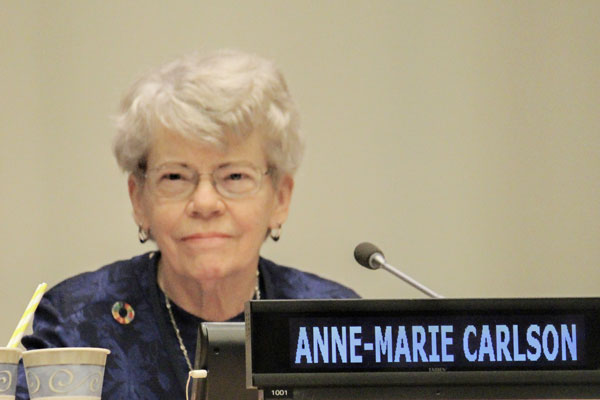
With respect to our choice of conference title, she pointed out what may be an eye-opener to some: climate issues aren’t new. A short video, entitled Global Warming – https://www.youtube.com/watch?v=MU9s0XyEctI from 1980 followed as an illustration. In that video, Journalist Walter Cronkite spoke of the greenhouse effect caused by coal, oil and natural gas emitting CO2 into the earth’s atmosphere; he warned of its consequences for health, agriculture, and sea level rise from melting ice caps that would engulf coastal cities in the next 30-50 years. Ms. Carlson questioned how much progress we’ve actually made in the 39 year interim and then introduced
Alison Smale, Under-Secretary General for Global Communications, gave the formal UN welcome. Echoing UN Secretary-General Antonio Guterres, who referred to climate change as the “defining issue of our time”(see our resource list for his remarks) and the Cronkite video, Ms. Smale said that as early as 1946, the UN Economic & Social Council (ECOSOC) promoted sustainable development worldwide. Yet since then, human activity has continued to cause degradation. She spoke about real and dire consequences of extreme weather patterns, plus water insecurity threatening the social and economic stability necessary for peace, and warned of apathy and resignation. “We know the problems, and we have the solution – unclean energy must end. We need the will to act,“ she said. Only through international cooperation can we hope to reduce carbon emissions to the required 1.5 degrees Celsius by the 2030 deadline. She stressed that teachers and students can be powerful change agents in this effort.
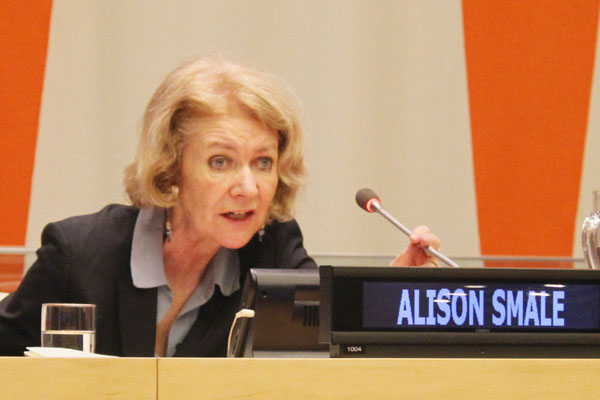
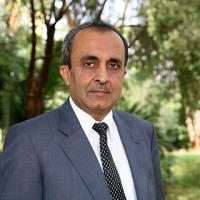 UNEP Opening Keynote
UNEP Opening Keynote

Jamil Ahmad, Director of the United Nations Environment Programme (UNEP) New York Office
introduced by Eileen Venezia – CTAUN Director–at-Large.
UNEP is responsible for ecosystem management & environmental governance, and ensuring that the Paris Agreement is fulfilled worldwide. 95% of UNEP's funding comes from donations.
Mr. Ahmad began by saying that, compared with 40 years ago, “there is hardly a discussion today that doesn’t involve climate change. It poses an existential crisis, and the problem is man made. More than 7 billion people are using the earth’s resources. If we continue consuming at our current rate, we would need a new planet, and the window of opportunity to fix it is shrinking. ” He followed this with alarming statistics from the GEO6 report released last month:
2 billion people in the world don’t have access to clean water or sanitation, and water resources are depleting - droughts have tripled over the last 50 years.
3 1/2 million will die of water-related diseases, and 7 billion deaths yearly derive from poor air quality.
30 million tons of plastic are dumped in the ocean annually, and deforestation also degrades the environment.
As ice melts, some islands are submerged; 80% of people live in danger of rising water levels.
730 million people live in poverty – not only in the developing world, but within wealthier countries as well.
The Secretary-General has said that doing more of the same will not get the job done. He has called for a universal framework for sustainable development, and a high level political forum to evaluate progress and practices involving the Sustainable Development Goals (SDGs). 90 countries have agreed to revamp their policies, and the UN plays a major role in the $5 trillion annually given to green investment. Poorer countries, where climate change has the greatest impact, depend on that support. But only systemic change will help –the goal of the 2030 agenda is to leave no one behind.
Our youth - 1.8 billion aged 10-24, the largest new generation ever, also have the right to a role in decision- making. He spoke about Greta Thunberg, the dynamic Swedish adolescent whose passion for immediate action is galvanizing – (“I don’t want you to be hopeful – I want you to panic!” she insists.) He envisions teachers as protectors of the planet, and a major positive influence on students for a responsible lifestyle. “Let’s start with ourselves,” he said. “Reduce, reuse, recycle and return to normalcy.”
Anne-Marie Carlson then added: “This is not someone else’s responsibility –it’s ours.”
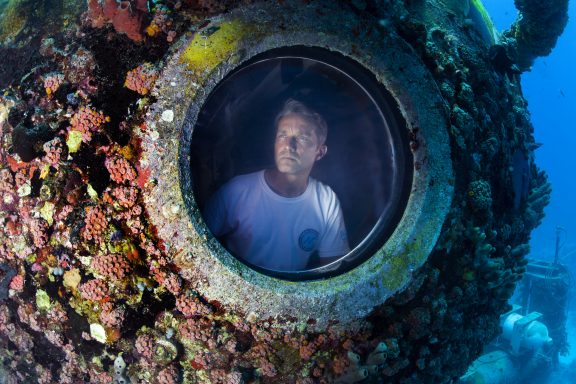 Multi-Media Presentation by Fabien Cousteau
Multi-Media Presentation by Fabien Cousteau

Mr. Cousteau is Founder/President of the Cousteau Ocean Learning Center. First grandson of Jacques-Yves Cousteau, he is also an aquanaut, documentary filmmaker, and conservationist.
Mr. Cousteau began with enthusiastic praise for the world’s youth. “Young people don’t know the word ‘impossible’,“ he said, encouraging them to keep the previous generation on the straight and narrow. He then addressed the question “Why are we here?”
The ocean, of which only 5% has been explored, is the driving factor for why we exist. It represents ¾ of the world’s surface area, and 99% of our living space, which 95% of the planet’s biodiversity call home. He spoke of a symbiotic relationship between humans and aquatic animal life, and the challenges we’ve created for them. 70% of aquatic life is dependent on coral reefs, the cities of the sea, and 60% of coral reefs, which may hold cures for malaria and cancer, are bleaching out. He quoted his grandfather, Jacques Yves Cousteau, former director of the Oceanographic Institute in Monaco, who said in 1956, “For most of history man has had to wage war on Nature in order to survive; now, to exist, we must protect it. People protect what they love, love what they understand, and understand what they’re taught.”
He suggests 3 approaches to teaching and protecting the environment:
- See what’s going on and share knowledge around the world
- Learn through the STEAM curriculum – Science, Technology, Engineering, Architecture and Mathematics
- Do restoration projects
His Ocean Learning Center (OLC) provides for communities at risk by cleaning beaches, building hatcheries to restore the sea turtle population in El Salvador from trafficking in sea turtle eggs, and planting mangroves in the Miami/ Ft. Lauderdale area and the Florida Keys. Mangrove roots serve as a nursery for a variety of invertebrates and juvenile fish. OLC also uses calcium carbonate and new technology for 3-D printing of coral reefs to replace lost coral, and promotes Citizen Scientist groups of volunteers.
In a Q&A he was asked, “What is the single most important thing we can change now? “Plastics,” he replied. One million pounds are dumped in the ocean every day, and on average, every person uses 8 single use pieces of plastic daily. We must stop making things of plastic (straws, for example) that we use only 30 minutes or less, yet which last 500 years. 50% of fish show signs of microplastics in their bodies, and so, when we eat fish, we’re gambling on eating our own garbage.
As part of his presentation, he showed a video of the Center’s work – entitled One Ocean, One People – Our Unique Oasis in Space. OLC creates educational resources for schools, from elementary to universities, as well as museums and other institutions, and sponsors events for high school and college students. Inquire at www.fabiencousteauolc.org

InfoFair
CTAUN invites UN agencies and other entities working on issues related to the Conference Theme to exhibit materials educators can use in the classroom. Organizations exhibiting at this year's InfoFair include those listed below
- UN Environment Programme
- UN Department of Global Communication
- Center for Earth Ethics
- Climate Museum
- Global Kids
- Hudson River Museum
- N.Y. Power Authority Environmental Justice Program
- Fabien Cousteau Ocean Learning Center
- One-To-World
- Peace Boat US
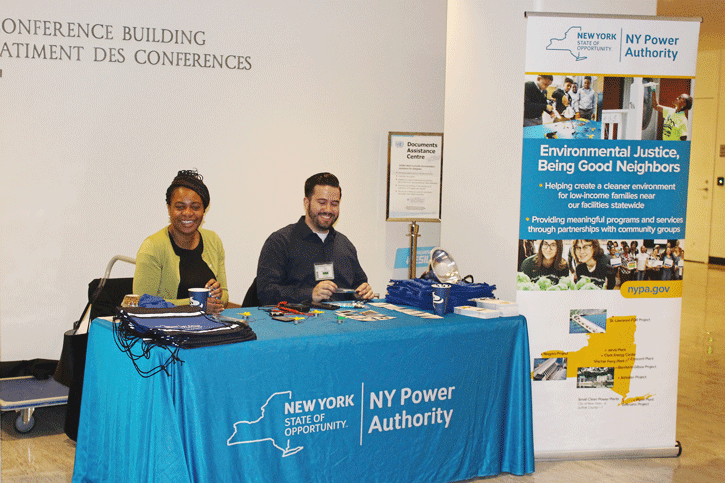

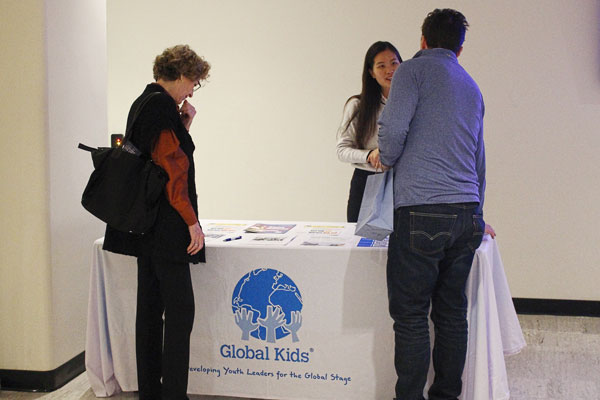
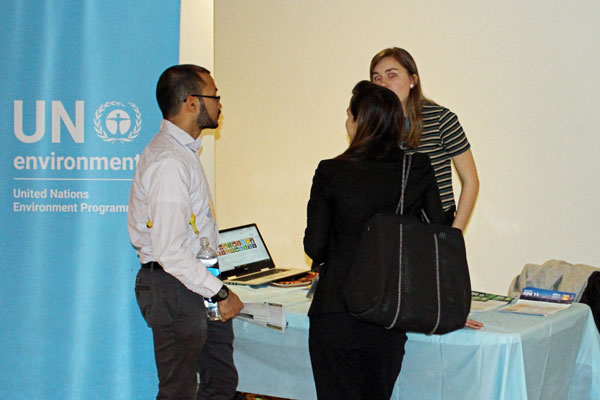
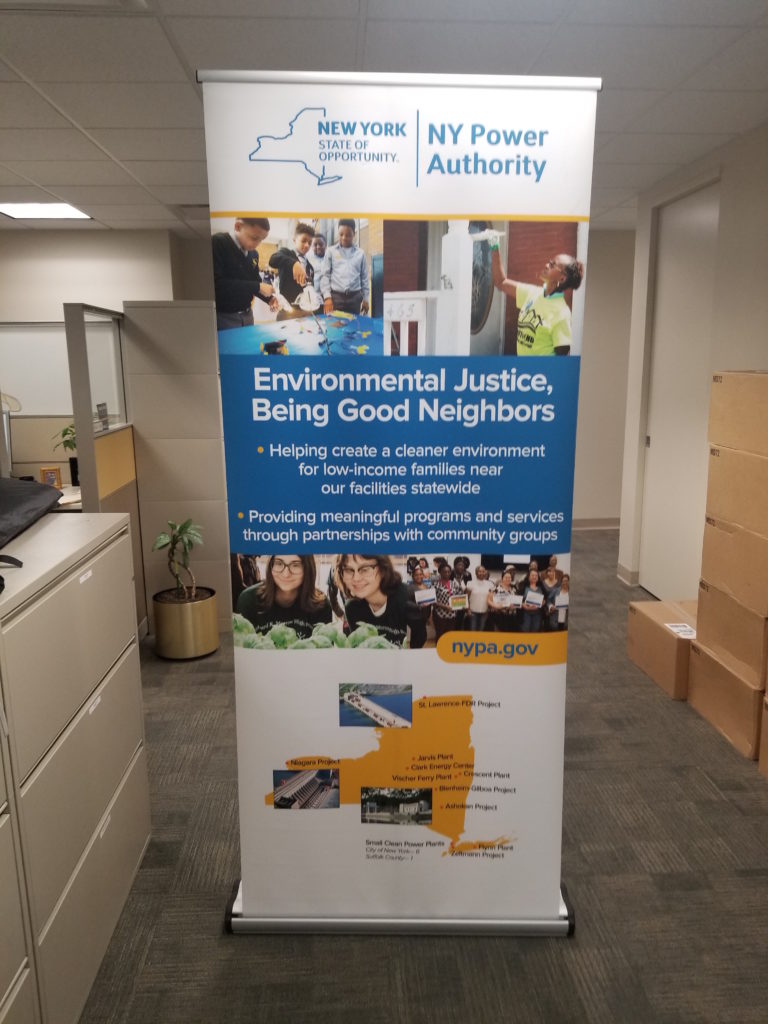
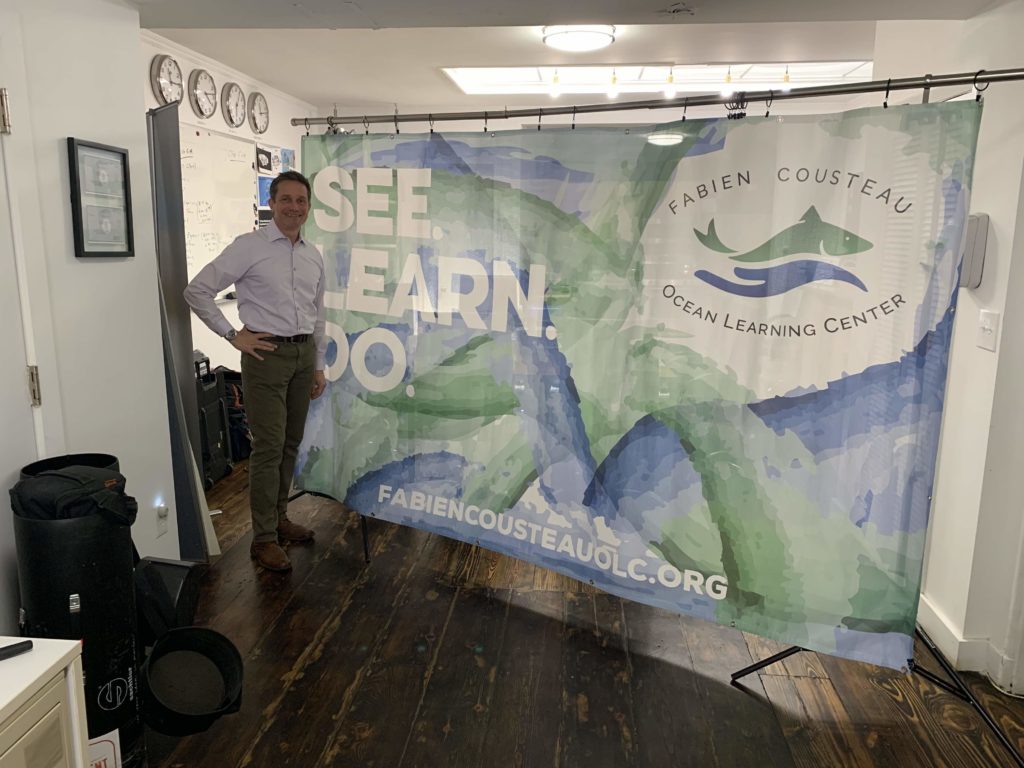
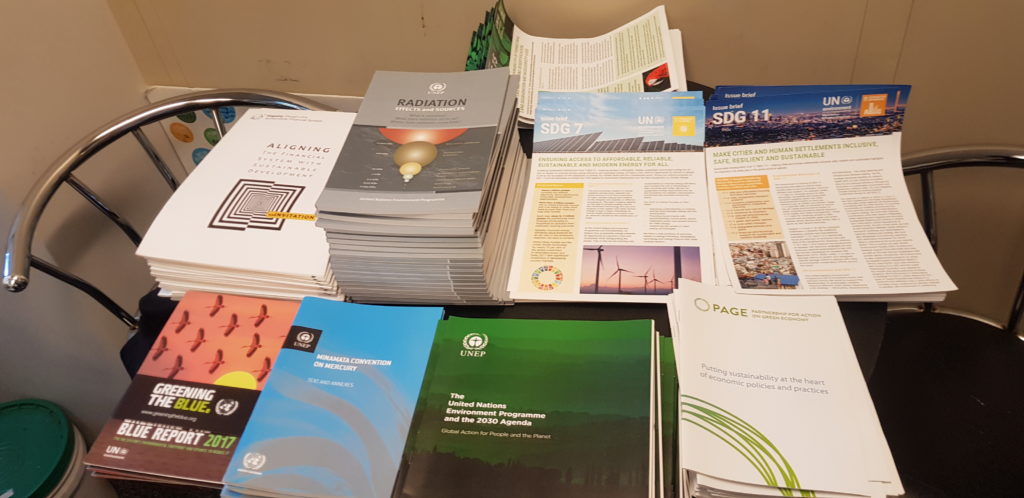
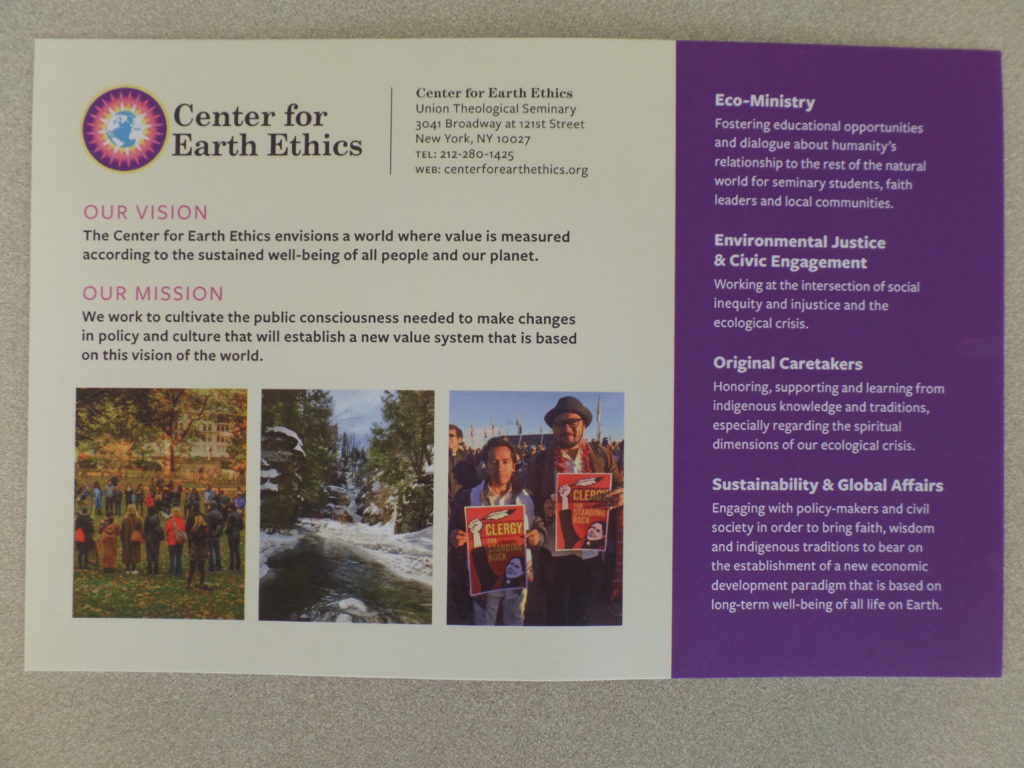
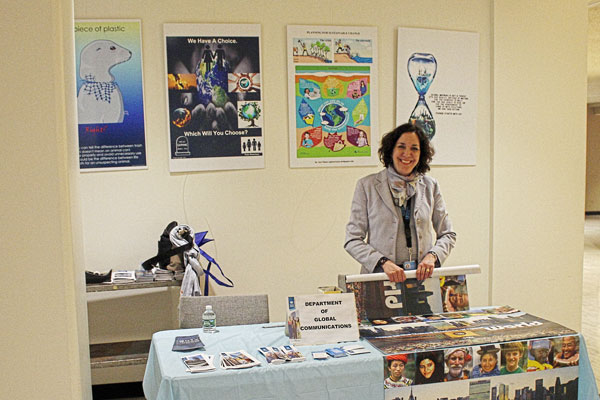
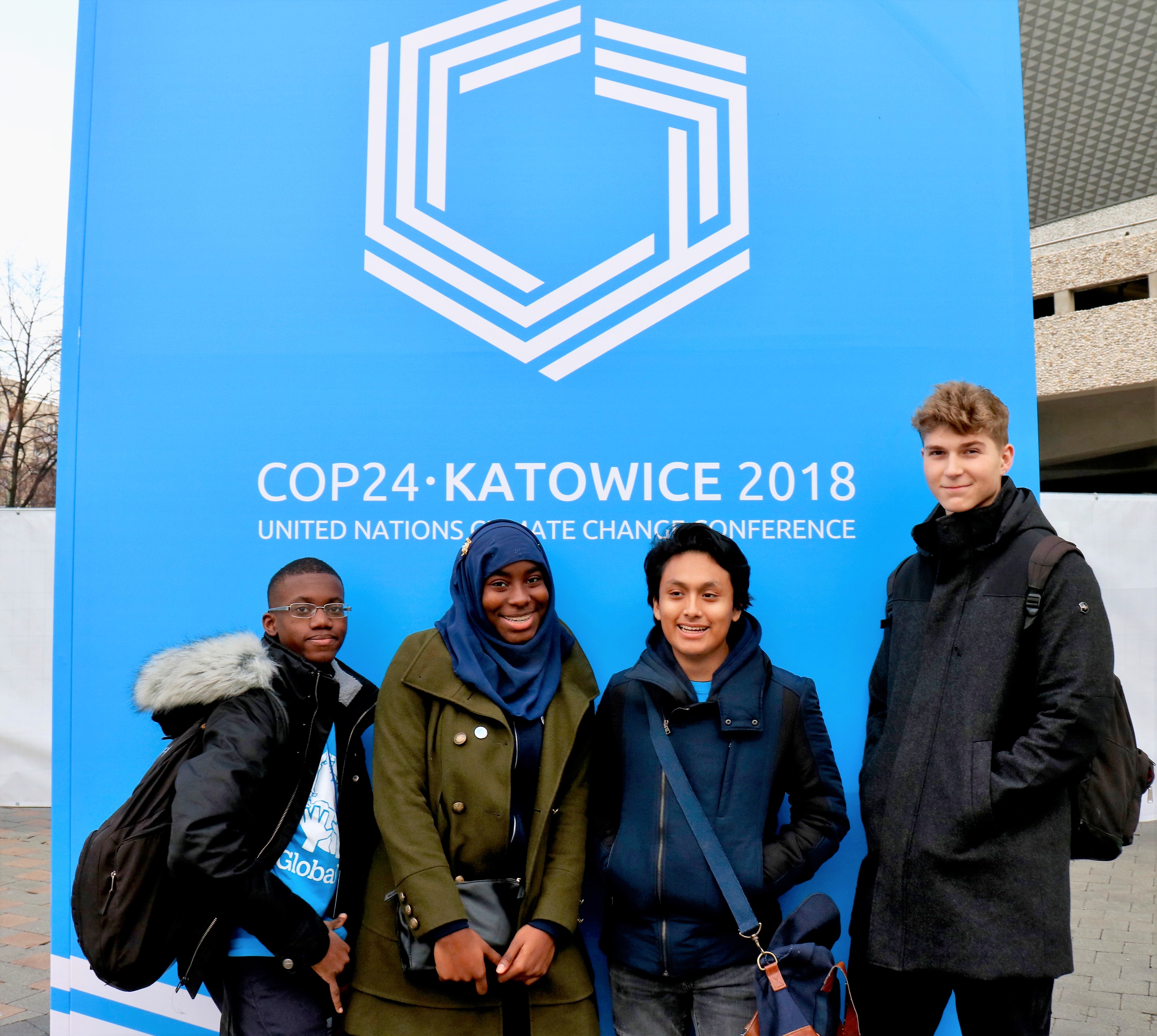 Global Kids - Youth Perspectives of COP24 in Poland
Global Kids - Youth Perspectives of COP24 in Poland

Global Kids works with youth in underserved areas, and reaches some 3000 students a week in NYC and Washington, DC.
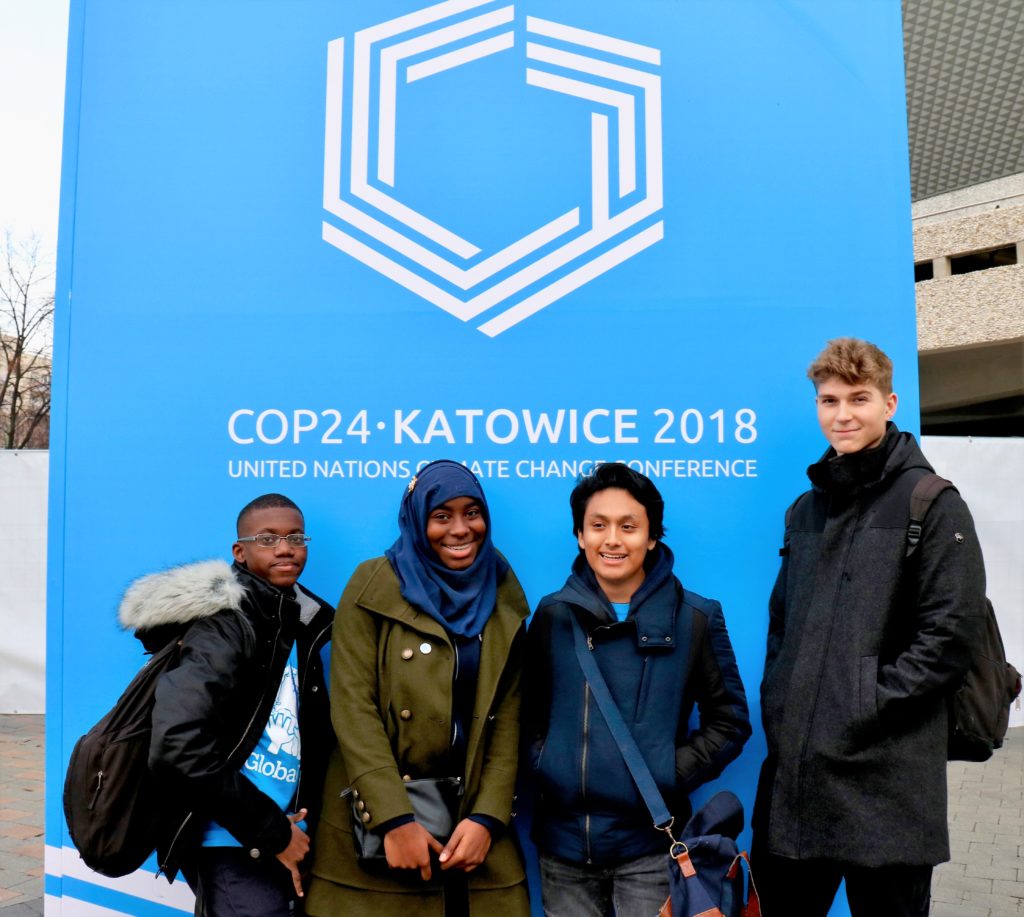
Josiah Dunn, an 11th grade student at John Adams High School in Queens, and Saheedah Majolagbe, a 10th grade student at the High School for Medical Professions, are both active in climate issues and were sponsored by Global Kids to attend the recent UN Climate Change Conference (COP24) in Poland. CTAUN invited them to talk about what they learned there and what actions they are taking as a result. Shantanu Roy, Global Kids Senior Advisor and an alumnus of the program, served as moderator. Mr. Roy is fluent in 5 languages; his school-based programs focus on workplace development, attendance improvement, youth leadership and international affairs.
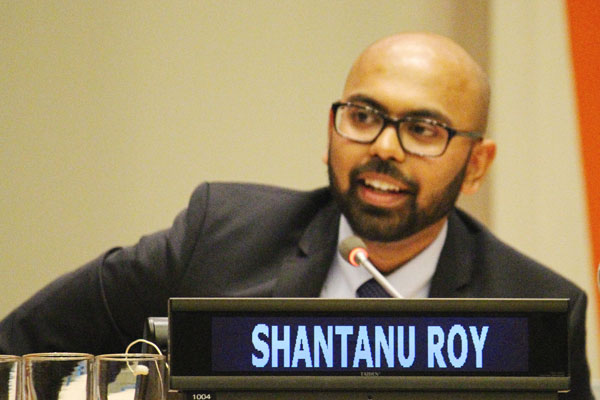
The panel was introduced by Elisabeth Shuman, CTAUN Executive Director
They were asked about their preparation for the conference, their activism in Poland and the impact they felt they made.
Josiah: We learned about the history of Poland and a few expressions in the Polish language, as well as climate events in and out of Poland. We studied the Paris Agreement, discussed the Kyoto Protocol, and why it was necessary to have these conferences over and over. We went to two Polish schools to teach about water pollution and found the kids there very knowledgeable and imaginative about the topic, though they didn’t know much of what was going on outside their own country. We also participated in a climate change rally, which we found exciting and energizing. (They demonstrated chants from the rally and got the audience involved.)

Saheedah: We learned about the effects of climate change on real people – such as job loss and other challenges.
We were invited to a youth organization, and interviewed by the media – in both cases I felt my voice as a young person was heard, not only in Poland, but by the world. Both felt they had made an impact, that Polish students were enthusiastic about activism and policy change, and that climate issues should be included in every curriculum, and could easily be incorporated into any subject area. ”Change only happens if we teach it.”

Climate Change - A Threat to Global Stability
- Irwin Arieff, Journalist, PassBlue
- Giovanna Kuele, Research Fellow, Igarape Institute, Brazil
- Susan Blaustein, Founder, WomenStrong International, and Co-Founder and Director, Millennium Cities Initiative (MCI), Earth Institute, Columbia University
- Franz Baumann, visiting Professor at NYU; former Assistant Secretary-General and United Nations Special Adviser on Environment and Peace Operations.
Irwin Arieff –a veteran journalist, with extensive experience covering the United Nations, international diplomacy and US politics, in New York, Washington and Paris, and also a member of CTAUN’S Advisory Council –served as moderator.
Mr. Arieff spoke about the Consensus project – a work of 21 years, and 4000 research papers in which 97.1% of scientists involved endorsed the consensus that climate change is real. “The science is clear - what is not is the politics,” he said.
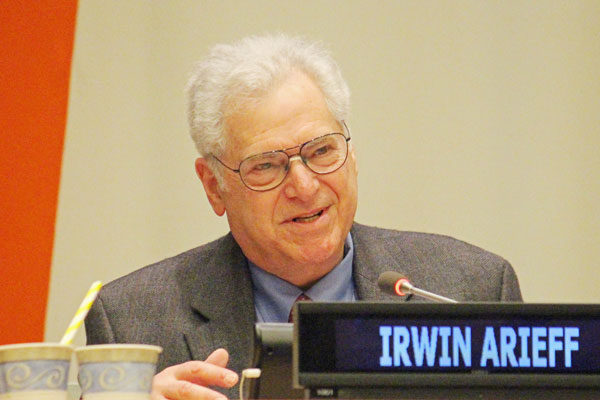
Susan Blaustein – Founder & Executive Director, WomenStrong International
Dr. Blaustein’s topic was How Climate Change Disproportionately Burdens Women and Girls and What We as Teachers Can Do About It. She started by giving us the current geographic scope of WomenStrong’s work – Ghana, Kenya, India and Haiti, and painted a vivid picture of how the downward spiral affects each region:
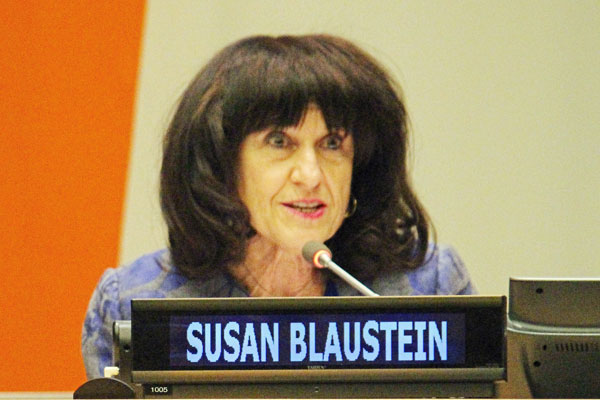
Kumasi, the capital of Ghana’s Ashanti region –
Less productive land is less valuable land, inducing landowners to sell to hungry real estate developers, who not only deforested more of the land in order to build, they literally sold out the farmers’ livelihood, disrupting traditional family life. The men were forced to take jobs as day laborers, or traders, sometimes venturing far away for months at a time. Women, in addition to being left to provide for their children, now had to buy produce they used to grow themselves, and then spend an arduous day trying to sell it in the marketplace to make ends meet, leaving children to fend for themselves.
Many children drop out of school. There is significant use of alcohol and drugs among boys, and some girls leave for town to live with older men who pay their school fees in exchange for sexual favors. They return home pregnant, ashamed, out of school and alienated from their friends and their dreams. In some cases, where men cannot find work at all, frustration and depression set in, fueling alcoholism and domestic violence. What starts with climate change tragically ends in community collapse.
Kisumu – in Western Kenya -
Drought parches ancestral villages, driving women to the slums of Manyatta. There is dramatically reduced rainfall due to climate change, compounded by decimated crop yield from over-farming. Kisumu is on the shores of Lake Victoria –Africa’s largest – fed by 5 rivers where water levels are at record lows, and the fish catch, according to the Global Nature Fund: E. Africa Living Lakes Network, has been reduced by 30-40 %. This affects the local fishermen, as well as the well-being, purchase power, diet and mores of the local population – “Sex for fish” is common as barter.
Southern India –
In the slums of Madurai, last August (2018) saw the worst monsoon flooding in Kerala State in 100 years. Many of the women in the WomenStrong program went to Kerala to help care for the displaced. Three months later, their own Tamil Nadu State was hit with Cyclone Gaja - its 180km/hour winds destroyed nearly 60,000 hectares of crops and trees, disrupting their food supply, driving up prices and demolishing their flimsy housing.
Haiti-
Currently the third most vulnerable country, in September and October 2018 the effects of Hurricanes Irma and Matthew coming within weeks of one another left ripped out banana fields, 800,000 needing food, $2.8 billion in infrastructure and crop damage and wiped out the only road in their mountainous commune. It also ravaged WomenStrong’s experimental tilapia nurseries in the northern part of the country. But the region was in crisis long before Matthew, causing fathers and youth to leave in droves for the capital or the Dominican Republic, placing crushing pressure on families and whole communities.
In New York, the properties most vulnerable to sea rise from Hurricane Sandy were not only low-lying, but harboring the lowest income populations as well. Power outages in public housing left residents without lights, elevators, refrigerators for their food and medicine, and access to public information, putting the elderly and disabled at risk.
The good news, which Dr. Blaustein calls both awesome and profoundly shaming, is that pro-active young people are leading the way to their future. She is the second of our speakers to point to 16 year-old Swedish activist, Greta Thunberg, organizer of the brilliant global school strikes for climate, who addressed both the UN climate conference in December and the rich and powerful at Davos in January. Her video Our House is on Fire, which can be seen on You Tube, is listed in our resources. In another case, 21 American students, ranging in ages from 23 -11, with the assistance of an NGO called Our Children’s Trust, have filed a lawsuit against the government for ‘violation of our constitutional rights and failing to protect essential public trust resources.’ Despite attempts by the current administration to kill it, the lawsuit is moving through the courts.
What can we as teachers do to give them hope and the tools they need to change politics and protect the planet? She suggested that activities like testing their water or nearby waterways with simple, available devices, and enumerating birds, frogs and other wildlife in their area are empowering additions to any science curriculum.
Giovanna Kuele is a doctoral candidate at the City University of NY Graduate Center, and a Research fellow, Igarape Institute, Rio de Janeiro, Brazil where she analyzed the role of women in the Colombian peace process, and studied innovations to prevent conflict in selected African countries;
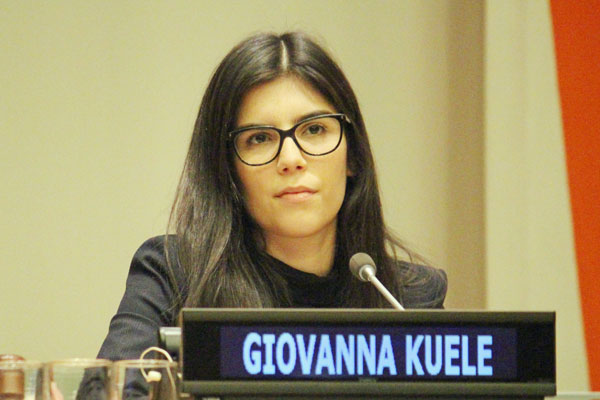
“Climate change is a multiplier of insecurity and conflict, crime and corruption. How do we engage countries whose leadership denies the existence of climate change, as well as those who recognize it?” She offered a list of suggestions:
- Engage with local and state governments (eg. states like California and New York) when the federal government fails to act
- Involve Civil Society
- Attract the private sector – make them aware of the economic costs of failing to act
- Talk with the military
- Win over youth - and let them win over their leaders
- Deploy soft diplomacy
- Avoid presenting climate and security as purely negative topics
- Show, don’t tell –present evidence/research–based work
- Promote a balanced approach to the debate
- Focus on specific stressors
Dr. Franz Baumann – Visiting Research Professor, NYU, focusing on international governance of climate change, the 2030 Agenda for Sustainable Development, UN Management Reform and the political economy of Africa; Former UN Assistant Secretary-General, and Special Advisor on Environment and Peace Operations

Dr. Baumann began by asserting that “It will not be our generation, but the young, who will change the world – and it needs changing. We are on a collision course with Nature. The climate has changed over time, but never as fast as in the last few years.”
“Global heating is the flip side of a success story,” he said. “As our wealth has increased, so has our population.” He used graphs for comparisons to illustrate the speed of change, and the growth of humanity on the planet. It took from year 0 till the time of Napoleon for the species to reach 1 billion, and not until the end of WWII to climb to the 2 billion mark. Yet we needed only 12 years to get to 6 billion, and only 8 more years to reach the 7th billion. Many children in the 19th Century died before their 5th birthday, and available resources were wind, water and wood, plus human ingenuity. In 200 years we changed the earth by our vertiginous use of fossil fuels, and due to improvements in health, human life expectancy has grown. In the 1950’s economy, the average annual salary was $500, and in 1970 there were 250 million vehicles on the road. Today there are 105 billion, predicted to double in 30 years. Humanity and emissions are not homogeneous: the GDP per capita of the US averages $60,000; in Ghana eg. it is $1100.
Solar panels and windmills will not solve the problem. CO2 stays in the atmosphere for centuries, and 58% of it was created in Europe and N. America. Global inequality gives 46% of the resources to 10% of the wealthiest. One US citizen uses double the electricity of someone in India, and six times as much as a person in Ghana. Energy use is greater now than in all former years combined. The affluent don’t want to give up their luxuries – including what are seen as necessities, such as planes and cars. Is it even possible in a capitalistic system? The deadline date was not set by politicians, but by Nature, and Nature doesn’t negotiate. The clock is ticking, and the tipping point will be reached in our generation and will be unbearable for our children and grandchildren.
This is the greatest public policy problem the world has ever faced. Change can only happen with cooperation and compromise – not attitudes like “America First” etc. When asked if overcoming the crisis is possible, he was pessimistic. “I fear we will not make it, “ he said.
In a Q&A to the panel about the industrialization of animal agriculture, he agreed that when it comes to food, the meat industry, especially beef production, has the highest carbon footprint. The global food system represents 30% of the world’s carbon footprint half of which comes from meat production and animal agriculture, surpassing the entire transport sector. In addition, overconsumption of meat is a public health risk, and the World Health Organization (WHO) has classified processed meat as a Group 1 carcinogen, alongside tobacco and alcohol. “Change what you choose to buy and eat.”
Dr. Baumann has offered to answer questions, and can be reached at franz.baumann@nyu.edu
Spotlight - Taking Action
Lia Cairone, Assistant Deputy Director, Policy, NYC Mayor's Office of Sustainability - introduced by Connie Rensink
Ms. Cairone focused on what NYC is doing to bring down carbon emissions. “New York,” she told us, “is committed to the Paris Agreement of having a total emissions level of 1.5% by 2030, and has reduced emissions in large city buildings from their current level by 17 % since 2017.” The plan is to achieve an 80% reduction by 2050. Efforts are being made to expand bike lanes by 50 miles each year, and to double the number of cyclists by 2020, as well as to accelerate the use of solar energy.
Nonetheless, the outlook is grim. There is no historical precedent for what we are facing. Even if we lower current and future emissions, cumulative past emissions are still present in the atmosphere. For a 50% chance of reaching the goal of carbon neutrality, emissions must reach net 0% by 2038. Current commitments would still raise our level of warming to a catastrophic 3%, as even 2% would disrupt all human activity. We are not on track. Change is only possible if we make it an urgent priority.
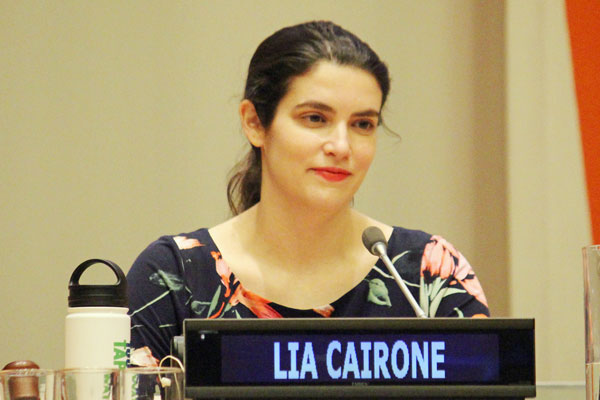
What's Next? - Part 1
- Cora Weiss, NGO Representative, International Peace Bureau
Cora Weiss – UN Representative - International Peace Bureau; President – Hague Appeal for Peace, outspoken advocate for women and social justice and Honorary Patron of CTAUN
Where do we go from here? How will we bring climate issues into our classrooms and into our communities? Will we de-vest in fossil fuels and invest in renewable energy sources? To get us thinking, Ms. Weiss asked everyone to stand, turn to someone next to them, and explain what we plan to do to translate the knowledge we received from today’s conference speakers into concrete actions. She believes there is a strong case to be made for climate change as a cause of war, referring to climate change and nuclear weapons as “Apocalyptic Twins,” which make today’s remarks an appropriate transition to our next conference topic, “War No More.”
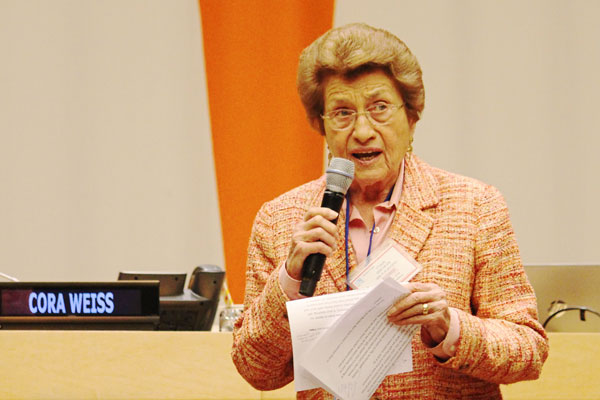
Awards Presentations
- CTAUN Global Citizen Award
- CTAUN Excellence in Education Award
- CTAUN Poster Contest for College Students
Global Citizen Award
This year’s Global Citizen Award, given in memory of Barbara Walker, one of the founders of CTAUN, was presented to Richard Curtis, screen writer and director, co-founder of the charity Comic Relief, and creator of Project Everyone, whose mission is to accelerate progress towards a fairer world by 2030, to eradicate extreme poverty, address climate change, and make injustice and inequality unacceptable. Mr. Curtis is the United Nations advocate for the SDGs; a key part of his initiative is “The World’s Greatest Lesson,” a program in partnership with UNICEF, designed to introduce the SDGs to children and young people around the world.
The award was presented by Narin Stassis -Vice-Chair of CTAUN. Mr. Curtis responded by videotape, with thanks to CTAUN for our work as well.
CTAUN also presented Excellence in Education Awards to educators who have used what they learned from attending a past CTAUN conference, to create classroom units that reflect the values of the United Nations. The winners were introduced by Eileen Venezia.
For the 7th year, awards were also given to Poster Contest winners from colleges and universities whose messages reflected the theme of the current conference – introduced by Thomas Ward, who reminded us that an academic poster is not just a poster – it is the beginning of a trajectory of research. (See the individual awards pages for details)
What's Next? - Part 2 - Looking Ahead to CTAUN's 2020 Conference - "War No More"
- Cora Weiss, International Peace Bureau
Cora Weiss is devoted to the ideal of a culture of peace and the idea of peace education. 2020 will be the 75th anniversary of the United Nations, which was expressly founded “to save succeeding generations from the scourge of war.” So CTAUN will be focusing next year’s conference on issues of preventing war and promoting peace.
Ms. Weiss spoke of 3 major causes of war:
- Climate change
- Nuclear weapons
- Species extinction (the next Earth Day, April 22nd 2019, has been devoted to protecting our species)
What does peace look like? What does it mean to our students? “If there will be no tomorrow, why should I go to school?” What is the impact of technology on war, and of gender in creating peace? What have Nobel Laureates to say about it? There is today, violent conflict in 80 countries. Peace has to be made possible – “War No More –forevermore! “

Many thanks to our team of note takers, Nancy Brown, Peter Brosnan, Percy Mdunge, and Peter Nolis, and to those speakers who shared copies of their remarks - Anne-Marie Carlson, Eve Gartner, Karenna Gore and Susan Blaustein – with gratitude to Peggy Montgomery for critical support. TG
